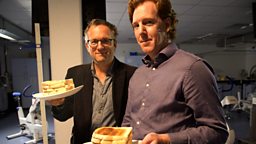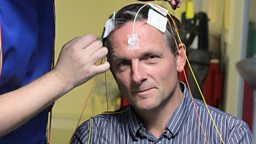The big experiment: could I lose fat just by changing my meal times?
It’s a tempting thought that we could all be healthier and even lose weight without changing what we eat at all – just WHEN we eat it.
Experiments with rats and mice have shown that moving their feeding times closer together in the day – and so giving them a longer period overnight when they were ‘fasting’, or not eating, made them lose weight and have healthier blood sugar and cholesterol levels – even when they were eating exactly the same food and number of calories.
But no one had done a similar (controlled and randomised) study with people – so we teamed up with the University of Surrey to try.
The experiment
We recruited 16 volunteers, and measured their body fat, blood sugar, blood fat (triglycerides) and cholesterol levels at the start of the study (after they had fasted for 12 hours).

We then assigned them to one of two groups.
The first group carried on their normal routine for the next 10 weeks, whilst the second group were asked to move the breakfast later by 90 minutes, and their dinner time earlier by 90 minutes (and they weren’t allowed any snacks or drinks after that).
This meant that they had 3 extra hours of fasting overnight.
Everyone kept a food and sleep diary to ensure that they were eating the same amounts of food as normal.
After the 10 weeks were up, everyone had the same tests done.
The results
At the end of the 10 weeks, the group that restricted their mealtimes showed a significantly healthier change in fasting blood sugar and cholesterol levels between the start and end of the experiment. There was no difference in their blood fats. The group that restricted their mealtimes also lost body fat.

What does this mean?
Although this was a small study, the results were significant, and in the light of the experiments in mice it appears likely that simply leaving it later in the morning to eat breakfast, and eating our last meal of the day earlier, could help us all be healthier.
There are two theories about why this might be – and both may be coming in to play.
Firstly, it’s now well known that periods of not eating – fasting – is good for our health. It allows the cells in our body to go into a ‘repair’ state rather than a ‘growth’ state. It seems that if we lengthen the ‘mini fasts’ that we have every night, this might itself be enough to give us a benefit, without us having to have whole days of eating little food.
Secondly, our bodies have a ‘body clock’ which affects how they deal with food over the 24 hour period. In the evenings, our bodies are preparing for night-time fasting, and this means that eating can affect our blood sugar and fat levels particularly badly. Michael did an experiment to investigate this – see ‘’
The researcher in charge of our study, Dr Jon Johnston, believes that we don’t all need to stick to a rigid regime of restricted mealtimes as our study volunteers did – social occasions can get in the way! However, he thinks that any time we CAN eat a later breakfast or an earlier dinner, we should try it, as every time we have a longer fasting period or avoiding a late-night meal, it’s helping our health.





































































































